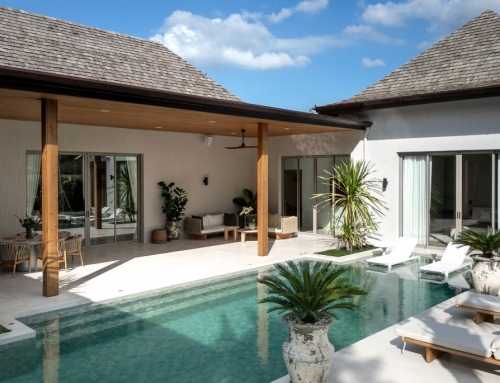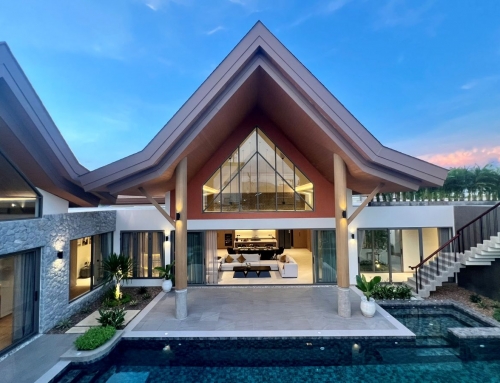Foreigners have long been drawn to Thailand, and Phuket is certainly one of the most beautiful and alluring places in the Kingdom.
With its stunning beaches facing west across the Andaman Sea, it is no wonder so many foreign nationals are attracted to the island.
People looking to put down roots here are naturally interested in property ownership, and many have their eye on houses or villas.
They are not necessarily keen on a long-term leasehold, but what if that lease were to be deemed a “Special Reciprocal Contract” instead?
While foreigners cannot own the land in Thailand, they can own the bricks and mortar, e.g. the building. But when the lease on their land expires, there are no protections to ensure that they may remain in their home.
Owning a physical building could count for nothing if that building sits on a piece of land that you are no longer entitled to occupy. And at the end of the lease period, the freehold landowner is within their rights to evict you.
Unless, of course, your lease has ceased to be a simple lease.
So What Is a Special Reciprocal Contract in Thailand?
Where a leasehold contract exists between two individuals, and the lessee makes changes or additions to the property which are deemed significant enough to created a “benefit” to the owner (lessor/freeholder) of that land, the lease contract may technically become a Special Reciprocal Contract (SRC).
In other words, the improvements made by the tenant/lessor to the property are deemed to be substantial enough that they actual alter the legal nature of the agreement. Clauses in a lease agreement which might otherwise be considered mere promises – unenforceable against a new owner if the lessor were to change – would instead become contract rights.
These include succession clauses, or extension/renewal clauses, which in a lease contract are not legally enforceable, but if the tenant has added value (or benefit) to the property, they could become contractual. (More on this below.)
A benefit is usually something which is only gained through financial outlay, and which has added value to the land. The construction of a house or villa on leased land, for example, would constitute an improvement which could be deemed to benefit the owner at the end the lease period. Leasing a property, then self-financing substantial renovations or improvements could similarly be considered a benefit.
In such circumstances the lease agreement may cease to be a lease agreement (under law) and instead become a Special Reciprocal Contract.
Is a Special Reciprocal Contract Written into Law?
There has never been an actual law stipulating the existence or application of a Special Reciprocal Contract. It does not appear in the Civil and Commercial Code, nor is it described in any other Thailand law.
Instead, Special Reciprocal Contracts were born of rulings handed down by Thailand’s Supreme Court. These decisions have been consistent, and their repeated application has been enough to create a legal precedent. (In a commercial context, SRC is known as a Build-Operate-Transfer Agreement (BOT). The lessee builds then uses the structure, and ownership of the building transfers to the Lessee at the end of lease term.)
The principle of legal precedent means that past decisions or rulings provide the basis and authority for judges confronted with similar cases at a later date.
The decisions of higher courts are mandatory precedents over all lower courts in the country, so it is highly significant in this case that the Supreme Court (the highest court in the land) has already weighed in on Special Reciprocal Contracts.
The SRC was essentially created to re-balance the benefits to the lessee, who typically gain little from a traditional lease, despite spending their own money to enhance the property. Judges therefore added extra value through the SRC, such as such as making a lease transferable, inheritable and non-registrable – yet nevertheless enforceable.
The fact that a lease declared to be an SRC is free from registration tax and transfer tax means judges will only rule in sincere cases, and SRC will not be accepted as mere ruse for every lease to be made free of these taxes.
Does The Lessor Have to Agree to Create an SRC?
A lessee cannot automatically assume any additional investment they make during the initial lease period will automatically create a Special Reciprocal Contract.
A lessee always needs the landlord’s consent to renovate, build or demolish, and without this authorisation, the lease cannot become an SRC. But even if there is no intention on the part of the landlord to create a Special Reciprocal Contract, it is still possible that their assent to certain improvements being financed by the lessee could give rise to an SRC.
Put simply: the permission is required in all instances, but the improvements could give rise to an SRC even if that is not the landlord’s intention.
The consent for a specific investment does not necessarily have to be given in the original lease contract, with details instead being agreed later in the lease term. But as long as the specific objectives are ultimately spelled out by both parties, and written consent is given by the freehold owner, the agreement could still be viewed as a Special Reciprocal Contract.
Why Does the Nature of the Contract Between the Two Parties Change?
A leasehold contract is classified as a “hire of property” contract. The lessee (tenant) is giving the owner (lessor) financial compensation for the hire or rent of their property, in this case the land, for a specific period of time. In Thailand the maximum permissible land lease is 30 years.
The agreement allows temporary lease rights, not more permanent contract rights. Basically, a lessee (the hirer) has the exclusive rights of use to the property for the full 30-year lease period.
But if that a foreign couple leases some land from a Thai national, and then decide to construct a luxury villa on that plot of land, they will have provided the land owner with a “benefit” (the villa).
At that time the lease agreement (a hire of property agreement) can take on certain contract rights (e.g. inheritability and transferability).
Consider the Possibility of a Special Reciprocal Contract From the Outset
For anyone contemplating a leasehold contract, whether from a developer or a private individual, it may be wise to consult a competent lawyer in advance on the possibility that the lease could one day be deemed a Special Reciprocal Contract.
The construction of a villa on leased land or the major renovation of a leased villa are typical types of investment – above and beyond the lease price of the property – which can be shown at the end of the 30-year lease term to have benefitted the landlord because ownership will ultimately revert to him/her.
Even if you approach the lease from the outset with a view to it one day being deemed a Special Reciprocal Contract, as mentioned above, any investment which could add sufficient value for this to happen must be agreed with the lessor.
As an interesting aside, because an SRC technically ceases to be a lease, a failure to register the lease at the Land Department would not invalidate the agreement or make it unenforceable.
Succession is Possible with a Special Reciprocal Contract
As mentioned above, if the agreement is deemed to be a Special Reciprocal Contract at the end of the 30-year lease period, it is no longer a typical hire of property contract, but becomes a kind of “Lease Plus”.
Because of this substantial change in the legal definition of the contract, the lease may be passed down to family members or other beneficiaries/heirs upon death. This is not the case with a typical leasehold which, under hire of property law, is not inheritable.
The value added to the property may also be considered sufficient to enforce an extensions or renewal against any lessor. Renewal clauses are promises under a lease, which may not be enforceable if the original lessor dies or sells the property. Under a Special Reciprocal Contract, however, these become contract rights, enforceable against any owner/lessor.
Why Are Special Reciprocal Contracts Not Used More Frequently?
This is a difficult question to answer, but it may lie in the fact that foreigners have been led to believe that buying landed property is not a questionable act, but is instead perfectly acceptable.
One of the obvious flaws in the real estate sector here in Thailand, especially that segment of the market aimed at foreigners, is that buyers are told that they are getting a 30-year lease, with two additional 30-year periods to follow. However, this is technically illegal and could void the entire lease if violators are caught.
The Problem with 30+30+30 Leaseholds in Thailand
Whereas foreigners a few decades ago understood that they had no rights to landed property ownership in Thailand, foreigners today frequently make villa purchases, and even buy and sell land. All of this activity could backfire one day, especially if the Thai Co. Ltd. is utilised not as a legitimate business, but as a holding vehicle that does not trade, file accounts or pay taxes.
If a foreigner simply wants to live in Thailand for the next 60 years, there is a financial logic in having exclusive possession rights of their villa for the duration of their stay, something an SRC would allow for. It certainly places you on a more sound legal footing than other means of acquiring a villa.
If villa developments throughout Thailand structured their sales whereby the lease to occupy the land was treated separately, then the purchase of the physical building (which a foreigner can legally own) could be deemed a “benefit” if the building owner gives it up to the land owner upon the expiration of lease terms.
Such a contract would then be drawn up to account for its eventual reinterpretation as a Special Reciprocal Contract. Rather than the standard 30-year lease term, this would effectively provide the lessee with a secure tenancy for 60 years, while renewal thereafter would still remain a possibility.
It is also apparent that buyers often make the wrong decisions because of poor legal advice, either from the developer, or even from a lawyer or accountant.
A developer could potentially prefer the ambiguity associated with a normal leasehold contract. If so, the idea of effectively guaranteeing a 30-year renewal through a Special Reciprocal Contract may not be very attractive. After all, such ambiguity may leave them, or their descendants, with a luxury property that they can sell all over again in 30 years’ time.
Conclusion
A lease agreement which is later deemed to be a Special Reciprocal Contract is clearly a better option than a 30-year lease, but is it better than using a properly formed and run Thai Company Limited to buy freehold?
One major benefit of an SRC is that you have none of the extra costs which are involved in keeping the company running correctly. The SRC gives the foreigner at least 60 years of uninterrupted enjoyment of their home, with no additional expenses.
A Thai company – with legitimate shareholders, conducting proper business, generating revenue, filing audited accounts, paying taxes and adhering to the corporate laws of Thailand – has an added cost element.
But the foreigner who buys through a legitimate Thai Company does have an investment asset that can readily be re-sold to other foreigners at a later date, with the potential for earning capital gains.





Social Contact